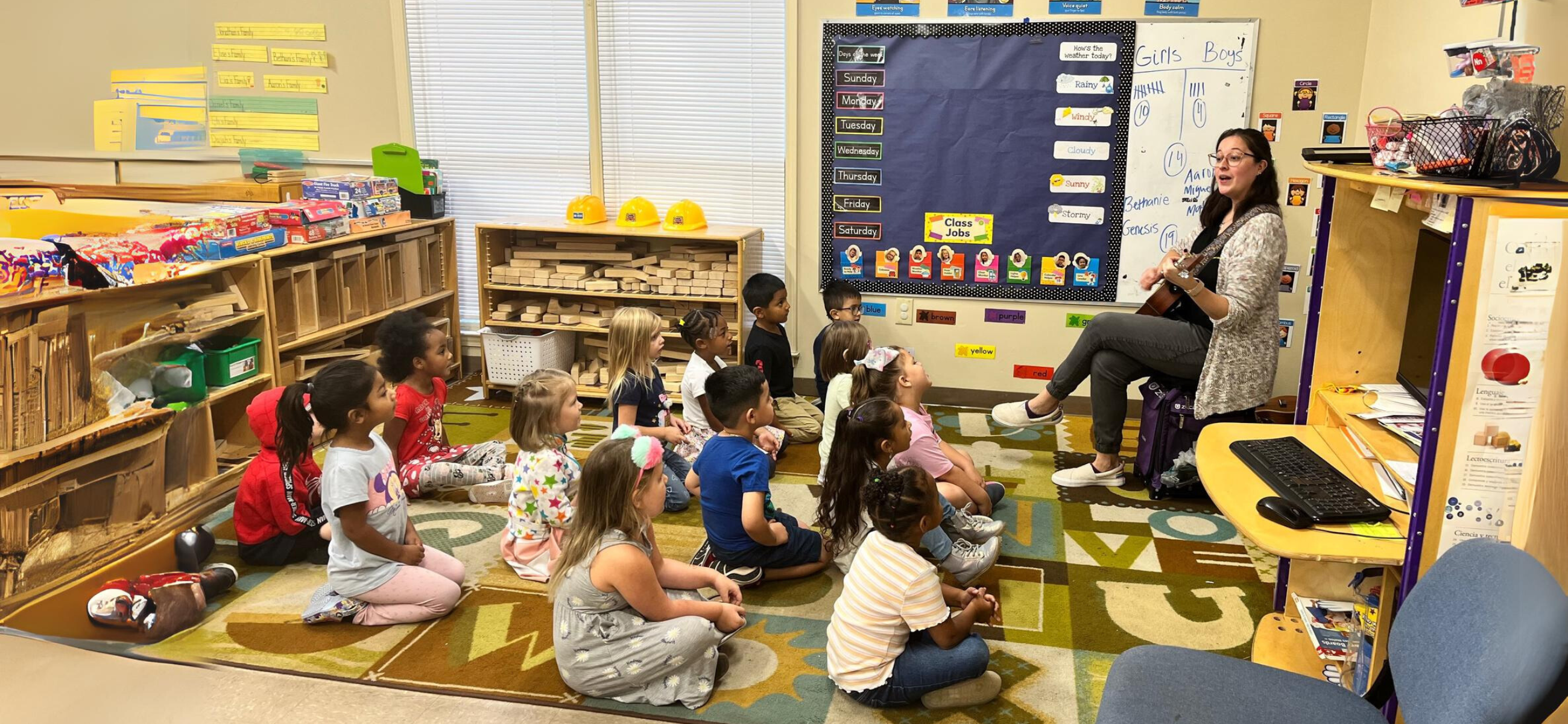Stay ahead of the curve as a political insider with deep policy analysis, daily briefings and policy-shaping tools.
Request a DemoStruggling child care providers ask lawmakers to tap lottery funds

Header photo: A teacher plays guitar and sings to Pre-K students at a child care center in north Georgia. (Credit: Easter Seals of North Georgia).
The Gist
ATLANTA — Child care providers and child advocates urged legislators Wednesday to invest more state funds in pre-K and early care programs at the meeting of the House Working Group on Early Childhood Education.
What’s Happening
The Working Group was created by House Speaker Jon Burns, R-Newington, last spring with a goal of expanding access to pre-kindergarten programs in Georgia. The state’s pre-K program budget of $444 million currently funds pre-K for up to 84,000 4-year-olds annually. Several thousand more students linger on a pre-K waiting list.
Many child care centers in Georgia are struggling to serve the needs of preschool-age children and their families, due to a shortage of qualified teachers and staff, and a lack of funding to cover staff salaries and basic operations. The recent loss of federal funding to stabilize child care centers, distributed during the COVID-19 pandemic, is exacerbating these challenges.
The Short-Term Assistance Benefit for Licensed Entities grant program managed by the state Department of Early Care and Learning has provided nearly a billion dollars in American Rescue Plan Act funds to Georgia child care providers and families. It has been used for workforce support, child care tuition relief and to help providers with operational costs. The last round of short-term assistance payments to child care providers went out in September and must be spent by June of 2024.
Why It Matters
According to a survey of 684 child care providers in Georgia conducted by Quality Care for Children in September, 44% say they may have to cut teacher wages, 36% anticipate they’ll need to lay off teachers and 25% say they may have to close their centers after they spend down their STABLE funds.
“With the end of STABLE, providers know they can’t roll back the higher salaries they are paying their staff or they will lose them,” said Becky Lehto, association child care director for the YMCA of Coastal Georgia. “But if they raise their fees they’ll lose the families that depend on them. Teachers and owners are burning out.”
Donna Davidson, CEO of Easter Seals of North Georgia, which serves 2,100 children at 19 urban and rural child care centers in Georgia, said her staff turnover rate is the highest in her 32 years at the organization.
With a teacher vacancy rate of 32%, their centers started the school year lacking 90 of the 350 teachers they needed to operate, she said. Due to staff shortages and the impending end of federal funding, Easter Seals has cut enrollment of children participating in its Head Start and Early Head Start programs by 26%, to 793 from 1,076 children.
Many families in Georgia cannot afford the cost of child care. The average cost of infant care in Georgia is $637 a month, while child care for a 4-year-old averages $542 a month, according to the Georgia Early Education Alliance For Ready Students. And many child care centers have no openings.
Results of a recent survey by the Georgia Early Education Alliance For Ready Students showed that 1 in 3 parents said they or another family member had to quit a job, not take a job or greatly change a job in the past year because of problems with child care.
What’s Next
Jessica Woltjen, senior policy manager for the alliance, asked the committee to recommend that the General Assembly increase state investment in the Child Care and Parent Services program by $20 million in the next legislative session. The CAPS budget for fiscal year 2024 is $62.5 million. Only 15% of eligible children in Georgia currently receive CAPS funding, which subsidizes the cost of child care for low income families and children with special needs.
Ife Finch Floyd, director of economic justice for the Georgia Budget and Policy Institute, said the Budget and Policy Institute wants legislators to “look at the lottery, and specifically the unrestricted lottery reserve, as a potential source for a down payment to boost the pay of pre-K assistant teachers,” whose base salary is $20,190, according to the Department of Early Care and Learning.
The Georgia Lottery reserve, which funds the state’s pre-K, HOPE college scholarship and student loan programs, now holds more than $1.9 billion. About $770 million must be held in reserve in case of a shortfall in lottery sales. The unrestricted lottery reserve now exceeds $1.1 billion.
“We’re working on costing out some of the recommendations for pre-K programs so we’ll be ready to make recommendations before the next session,” said Rep. Jan Jones, R-Milton, speaker pro tem of the House and chair of the House Working Group on Early Childhood Education, which will continue its work through December.
Related stories:
Have questions, comments or tips? Contact Jill Jordan Sieder on X @journalistajill or at [email protected].
Facebook @STATEAFFAIRSGA
Instagram@STATEAFFAIRSGA
LinkedIn @STATEAFFAIRS
Header photo: A teacher plays guitar and sings to pre-K students at an Easter Seals child care center in north Georgia. (Credit: Easter Seals of North Georgia).
Gov. Kemp calls on state agencies to be fiscally restrained amid record $16.5B surplus
The Gist Gov. Brian Kemp asked the state’s 51 government agencies for continued fiscal restraint when drafting their amended fiscal year 2025 and 2026 budgets. Most agencies adhered to his request even as the state’s general fund surplus hit a record $16.5 billion last month. Forty-five agencies, excluding state courts, followed the governor’s instructions to …
Georgia defies bomb threats as election chief declares a “free, fair and fast” vote amid record turnout
ATLANTA – Despite dealing with over 60 bomb threats, Georgia’s election chief said Tuesday the state’s general election went smoothly. Georgia had a record turnout with nearly 5.3 million people voting, Secretary of State Brad Raffensperger told reporters. Election officials in the state’s 159 counties have until 5 p.m. to certify votes. “We had a …
In the (state)house: Meet the newest members of the Georgia legislature
When lawmakers reconvene at the state Capitol on Jan. 13, there’ll be a cadre of new faces in the 236-member Georgia General Assembly, one of the nation’s largest state legislatures. All 236 statehouse seats were up for election this year. Most candidates ran unopposed. Incumbents in contested races easily kept their seats, with the exception …
2 young Democrats win Statehouse seats as Republicans hold majority
ATLANTA — Many Statehouse incumbents appeared to beat back challengers Tuesday, ensuring their return to the Capitol in January. Republicans retain control of the House and Senate. Two Generation Z candidates will join the 236-member Legislature as new members of the House of Representatives: Democrats Bryce Berry and Gabriel Sanchez. Berry, a 22-year-old Atlanta middle …




